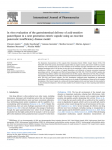Long-standing issues result in warning letter for Teva

Teva’s facility, based in Florida, US, was acquired during the company’s $40.5bn (€35.9bn) acquisition of Actavis, and had already experienced issues. Previous inspections in 2013, 2016 and 2017 resulted in citations by the US Food and Drug Administration (FDA).
As these were related to similar current good manufacturing practice (cGMP) issues, the FDA has deemed Teva’s remediation activities inadequate and issued a warning letter.
In feedback delivered in its warning letter, the FDA stated, “These repeated failures demonstrate that executive management oversight and control over the manufacture of drugs is inadequate.”
The issues outlined in the warning letter reveal that the facility has experienced issues with its laser-drilled tablet manufacturing processes, which the agency described as “insufficiently designed and managed” to be able to meet the appropriate drug delivery profile of the product.
The product in question is paliperidone extended-release tablets, which requires a hole to be drilled into the tablet for correct delivery.
However, the FDA deemed that a single quality assurance inspector searching for tablets that did not have a hole, which can be as small as 0.3mm, was not a sufficient safeguard against improperly produced tablets.
Teva responded to the FDA’s concerns by making a commitment to improve lighting at the facility, providing inspectors with magnification equipment, and developing a qualification program for inspectors. However, the FDA regarded these steps as insufficient and proceeded to issue a warning letter.
The notice of failings in its production process comes as Teva looks to overhaul its manufacturing network, which grew rapidly through a number of acquisitions.
















